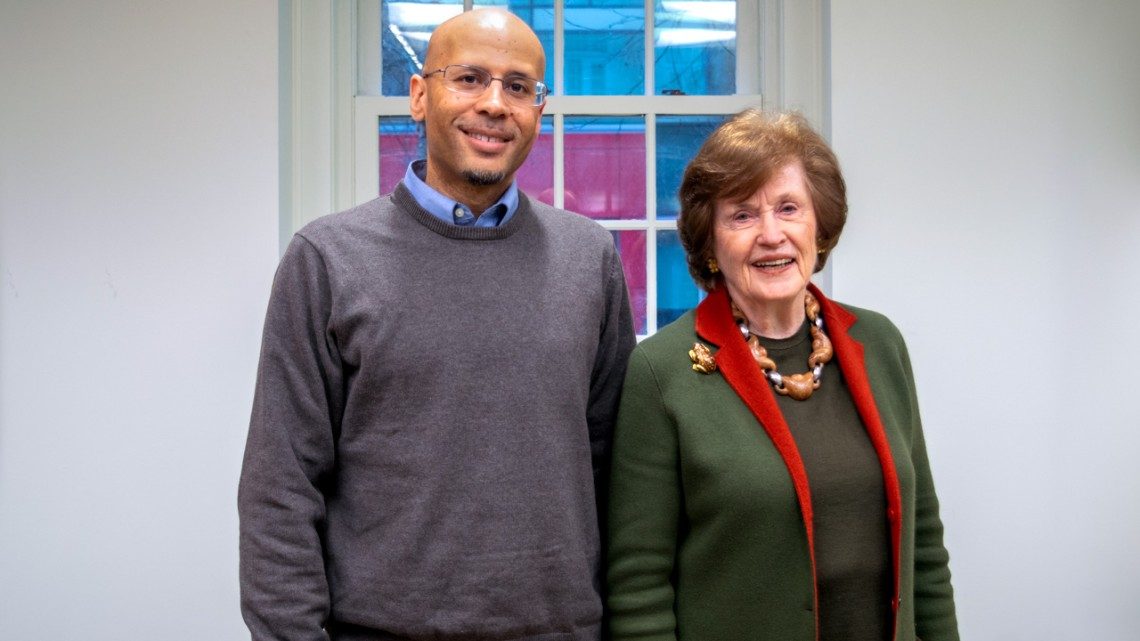The university was founded on Ezra Cornell’s conviction that educating one student reaches a generation of others. He was moved by the idea that a transformed life carries the remarkable potential to change the world.
In fiscal year 2023, more than 50 Cornell alumni—representing class years that span seven decades—established new scholarships that invest in this potential. The scholarships are part of Cornell’s Undergraduate Affordability Initiative, an effort to enhance the socioeconomic diversity of Cornell’s undergraduate student population.
Kathy Delsanter ’63, MS ’65, one of these donors, wants Cornell to preserve and enhance its socioeconomic diversity. “Supporting first-generation and low-income students has been my concern. Ever proud of Cornell’s need-blind admissions policy, I’ve sought ways to support these students, who, once admitted, might arrive on campus in an unfamiliar social environment with fewer-than-optimal supports in place.”
The Undergraduate Affordability Initiative seeks to decrease the average debt burden of middle-income students by increasing institutional scholarships and aid. It also aims to give students from low-income families an additional grant opportunity for academic and professional exploration. Cornell has already eliminated loans for low-income students, but this grant gives them the chance to pursue meaningful opportunities that would otherwise be too expensive for them to cover.
The initiative will make a meaningful difference in the lives of Cornell students. For example, aided students will graduate on a better financial footing because of a lower debt burden. It would also allow these Cornellians to have a wider range of career and advanced educational opportunities that may have otherwise been limited by their financial circumstances.
Donors Michael A. Bonarti ’87 and Judith Germano ’91 know firsthand what financial aid means for students.
“Since neither of our families was able to finance in full the cost of our undergraduate educations, we are grateful to have benefited from the generosity of earlier Cornell alums who made our attendance possible,” the couple said in a joint statement. “Our Cornell education opened doors that led to successful professional careers for each of us as attorneys, and we have always felt committed to giving back to one of the finest institutions of higher learning.”
The current initiative builds on the work of previous affordability efforts at Cornell.
Since the Great Recession, Cornell has made significant strides to reduce student debt through its enduring commitment to providing need-based aid. The current initiative builds on the work of previous affordability efforts that have allowed Cornell to steadily replace loans with grants and to institute loan caps for all undergraduate students. It also continues to build on Cornell’s efforts to guarantee financial aid packages that meet the full demonstrated need of all undergraduates.
Thanks to donor support, Cornell has been able to invest in financial aid at a rate that significantly exceeds the annual tuition increase. As a result, students receiving financial aid today actually pay less to attend Cornell than students who attended 20 years ago.
For the 2023-24 academic year, Cornell has been able to award more than $400 million in need-based grant aid. This kind of aid, which does not need to be repaid, touches the lives of more than 7,000 undergraduates.
The Undergraduate Affordability Initiative—a key priority of Cornell’s To Do the Greatest Good campaign—is bolstered by an ambitious challenge match program. The university has set aside $50 million to enhance gifts by contributing an additional dollar for every two dollars given by endowed scholarship donors.
“I have been fortunate in not having to take out large loans to finance any part of my education,” says scholarship donor Dr. Pamela I. Brown ’73. “This made me want to support students who are less fortunate. Cornell was so important in my education that I would like to see the university be successful in enrolling top-notch students regardless of their ability to pay.”
For donor Tanni Wu ’06, her interactions with fellow alumni inspired her to do her part to keep a Cornell education affordable for all.
“Throughout my Cornell career and during my decade-plus experience as an alumni volunteer, I have encountered a number of brilliantly accomplished Cornellians whose life-changing Cornell education was made possible by the generosity of those who came before us,” she says. “I have learned so much from their diligence, focus, and sense of purpose and wanted to do my modest part to help sustain this tradition.”
Education is a great equalizer in our society, says Bonarti and Germano.
“Our hope is that by supporting the Cornell Undergraduate Affordability Initiative, we are doing some good to help others enjoy the same great Cornell education that so benefited the two of us.”





